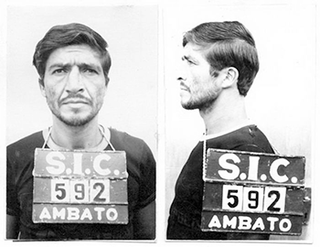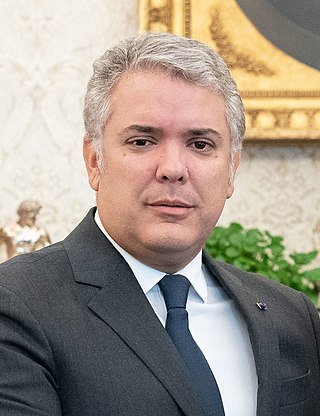Related Research Articles

Pedro Alonso López, also known as The Monster of the Andes, is a Colombian serial killer, child rapist, and fugitive who murdered a minimum of 110 people, mostly young women and girls, from 1969 to 1980. López claimed to have murdered over 300 people. He is considered by many as one of the most prolific serial killers and rapists in history.

Julio César Turbay Ayala was a Colombian lawyer and politician who served as the 25th President of Colombia from 1978 to 1982. He also held the positions of Foreign Minister and Ambassador to the United States.

El Tiempo is a nationally distributed broadsheet daily newspaper in Colombia launched on January 30, 1911. As of 2019, El Tiempo had the highest circulation in Colombia with an average daily weekday of 1,137,483 readers, rising to 1,921,571 readers for the Sunday edition.

El Espectador is a newspaper with national circulation within Colombia, founded by Fidel Cano Gutiérrez on 22 March 1887 in Medellín and published since 1915 in Bogotá. It changed from a daily to a weekly edition in 2001, following a financial crisis, and became a daily again on 11 May 2008, a comeback which had been long rumoured, in tabloid format. From 1997 to 2011 its main shareholder was Julio Mario Santo Domingo.

Iván René Valenciano Pérez is a Colombian former professional footballer who played as forward. He is the second top goalscorer of all-time in the Colombian Primera A with 217 goals, behind Argentine Sergio Galván Rey, who surpasses him with 224 goals.

Juan Manuel Santos Calderón is a Colombian politician who was the President of Colombia from 2010 to 2018. He was the sole recipient of the 2016 Nobel Peace Prize.

The Office of the Inspector General of Colombia is a Colombian independent public institution overseeing the public conduct of those in authority or in charge of exercising a public office, and of overseeing the correct functioning of other government institutions and agencies. The Office of the Inspector General of Colombia is not a judicial institution; it is one of the Colombian Control Institutions, alongside the Office of the Controller General. The Inspector General is also charged with safeguarding the rights of the people, guaranteeing Human rights protection and intervening in the name of the people in the defence of the public's interest.

Gustavo Francisco Petro Urrego is a Colombian politician, economist, and former member of the M19 armed guerrilla movement. He has been serving as the president of Colombia since 2022. Upon his inauguration, he became the first left-wing president in the recent history of Colombia.

Mass media in Colombia refers to Mass media available in Colombia consisting of several different types of communications media: television, radio, cinema, newspapers, magazines, and Internet-based Web sites. Colombia also has a national music industry.

Fidel Cano Correa is a Colombian journalist, born 23 November 1965 in Bogotá. Since May 2004 he is the publisher of El Espectador, Colombia's oldest newspaper.

María Clemecia "Tutina" Rodríguez de Santos is a Colombian socialité and graphic designer. As the wife of the 32nd President Juan Manuel Santos María Clemencia served from 2010 to 2018 as First Lady of Colombia, being the third wife of a president to serve for eight years and the second consecutively.

Nohra Puyana de Pastrana is the wife of the 30th president of Colombia, Andrés Pastrana, and served as First Lady of Colombia from 1998 to 2002.
Media ownership in Colombia is highly concentrated. The four largest newspapers together account for two-thirds of total readership, and the two largest television channels have about two-thirds of the market and 78% of advertising revenues, according to a 2016 study by Reporters Without Borders and the Colombian Federation of Journalists.

Iván Duque Márquez is a Colombian politician and lawyer who served as the president of Colombia from 2018 to 2022. He was elected as the candidate from the Democratic Centre Party in the 2018 Colombian presidential election. Backed by his mentor, former president and powerful senator Alvaro Uribe, he was elected despite having been relatively unknown a year before the election. He ran on a platform that included opposing Juan Manuel Santos' peace agreement with the FARC guerrilla group. After Duque's term came to an end, he was succeeded by Gustavo Petro on 7 August 2022, after Petro won the runoff round in the 2022 Colombian presidential election.
Granahorrar Bank was a bank based in Colombia that was open from 1972 to 1998. When it was open, it was part of a business conglomerate called Grupo Grancolombiano. The conglomerate also owned Banco de Colombia (Bancolombia), which is Colombia's largest bank.
Héctor Germán Buitrago Parada, also known as Martín Llanos, and also as Patezorro or Marroco, is a Colombian right-wing paramilitary leader and drug lord. At the time of his arrest by authorities he was considered the last one of the big paramilitary leaders, as he had been successful in evading capture for years.
Colombia magia salvaje is a Colombian documentary film released in 2015, directed by Mike Slee and produced for Éxito Group, by the Ecoplanet Foundation and the British firm Off The Fence. The film is a sample of the biodiversity of Colombia, recorded in 85 different locations to achieve the portrait of 20 ecosystems.

Rodolfo Hernández Suárez is a Colombian politician, civil engineer, and businessman who served as a senator of Colombia from July to August 2022. He was mayor of Bucaramanga from 2016 until his resignation in 2019. As the nominee for the League of Anti-Corruption Governors (LIGA) coalition, Hernández placed second in the first round of the 2022 Colombian presidential election, and he was ultimately defeated by Gustavo Petro in the second round run-off election. Hernández then accepted a senate seat offered to the runner-up in a presidential election and took office on 20 July. Hernández resigned his seat after serving for less than four months, citing incompatibility with the position. His departure fueled widespread speculation that he intended to run for office in his department of Santander.
The Robbery on the Bank of the Republic, also known as The robbery of the century in Colombia, was a robbery perpetrated on October 16 to 17, 1994 against a branch of the Bank of the Republic, located in Valledupar and in which the thieves took the sum of just over 24 billion Colombian pesos. The robbery was the largest amount stolen in paper currency in the history of Colombia.
References
- ↑ Semana. "TERMODORADA". TERMODORADA. Retrieved 2018-05-24.
- 1 2 Tiempo, Casa Editorial El. "EL HOMBRE DE GRANAHORRAR". El Tiempo (in Spanish). Retrieved 2018-05-24.
- 1 2 Semana. "PELEA DE SOCIOS". PELEA DE SOCIOS, Sección Economía, edición 815, Jan 12 1998. Retrieved 2018-06-15.
- ↑ Tiempo, Casa Editorial El. "Carrizosa, el ganador detrás de Granahorrar". El Tiempo (in Spanish). Retrieved 2018-06-15.
- 1 2 3 4 5 6 "Panel considers Colombia's "illicit use of regulatory authority" in seizure of bank". Florida Business Daily. 2018-09-05. Retrieved 2018-09-09.